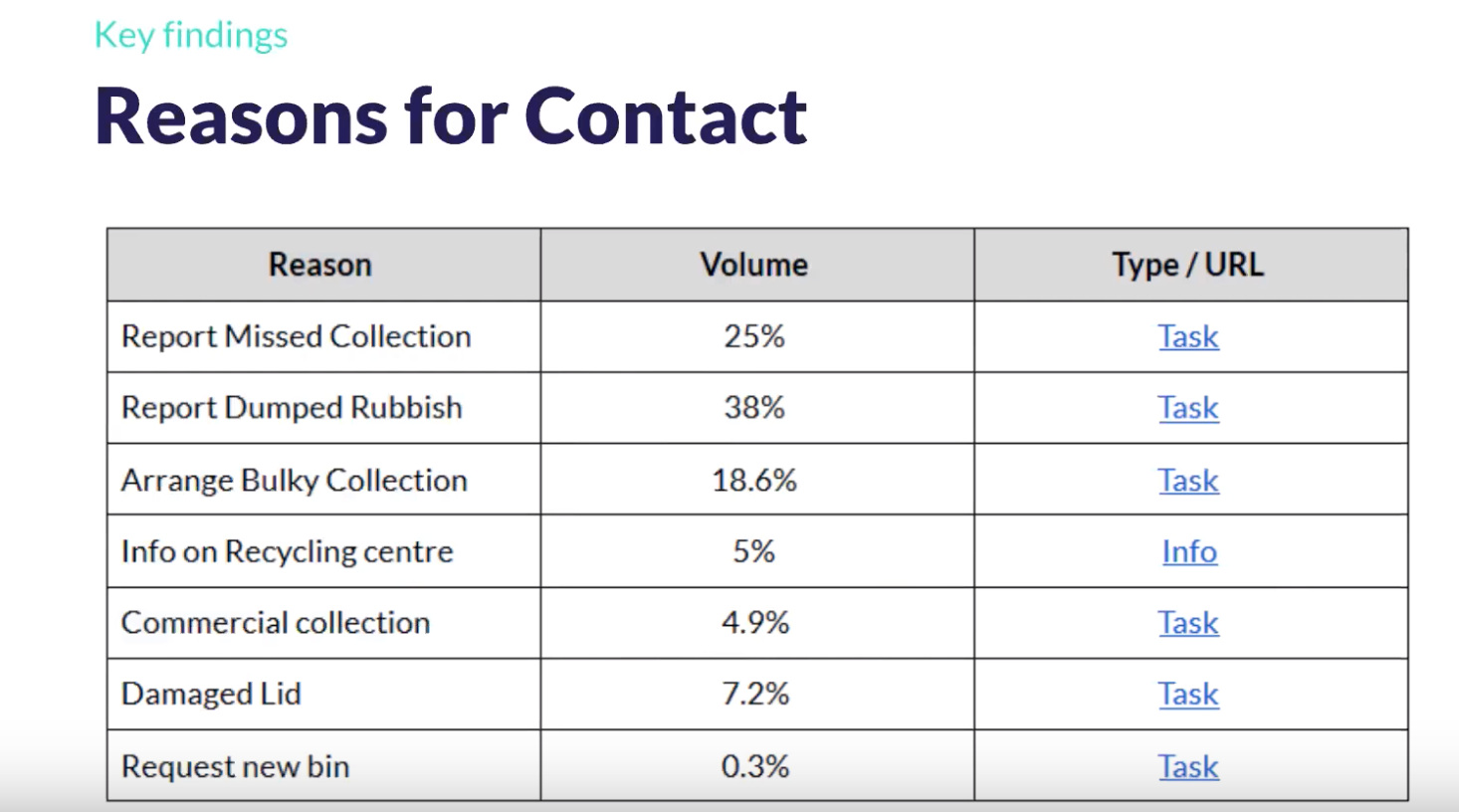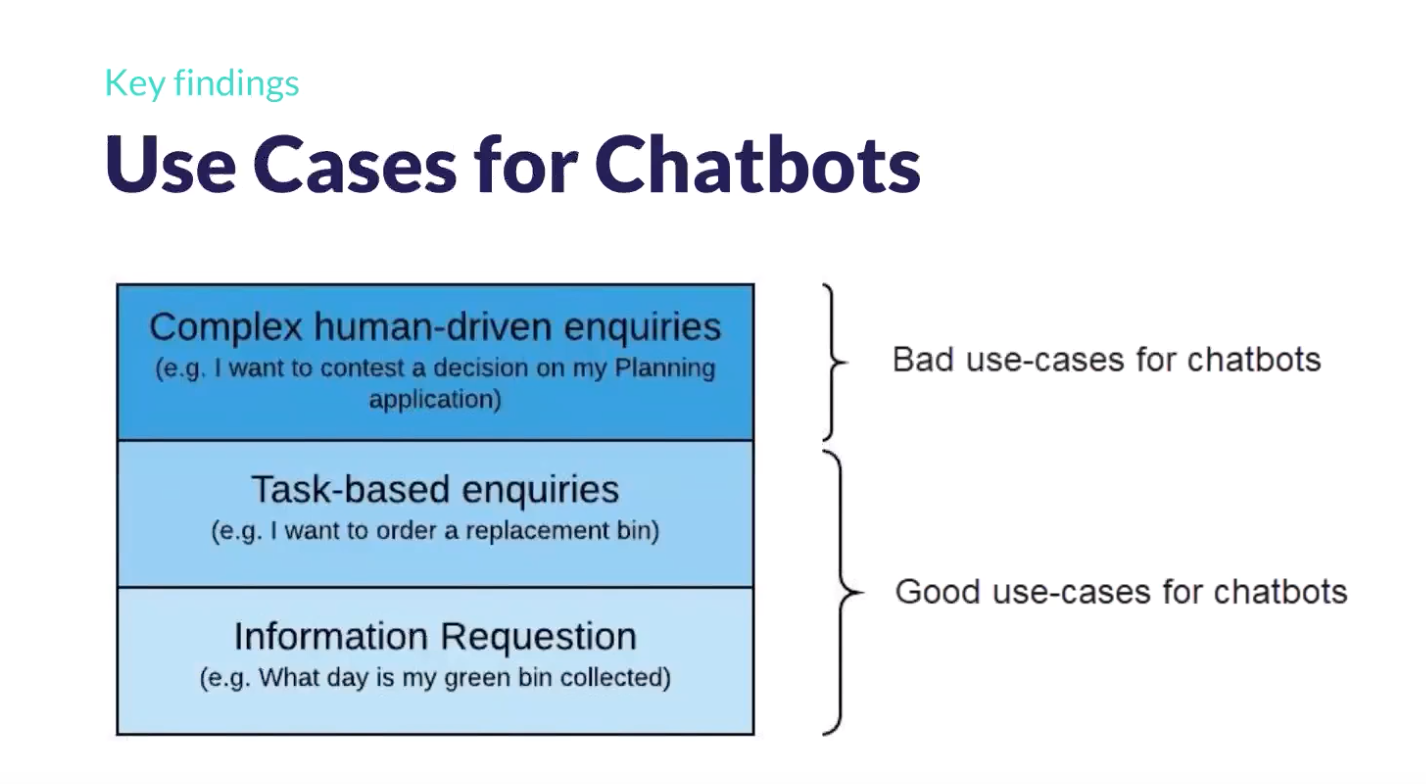Sprint #2: Waste and Recycling
This week we completed Sprint #2 of the project, looking at waste and recycling services across four councils. As well as user research interviews with 24 members of the public there were stakeholder interviews with 9 staff in councils.
Show and Tell
The complete event is recorded here
Slides from the session are here
User research interviews
North East Derbyshire
Luiza from Torchbox fed back on the interviews that she and Kyle had conducted in North East Derbyshire.
Most users were looking for something or making a service request; all were simple interactions and on the whole users had a positive experience.
This is a really simple journey and I think that there is a lot of opportunity to improve access to information and the ability for users to self-serve on the website
The majority of users defaulted to using a mobile phone - they didn’t need a desktop (like when using planning services, which was more complex). Using a mobile was a quick and easy method, allowing access to the web or to call if needed.
Everyone had a difficult experience on council website, with some having to go back to google to search for what they wanted, or just give up and make a call to the council.
Everyone said “I would prefer to self serve - I would prefer to do things myself if I can” but people would not hesitate to pick up the phone if they became stuck
Users are confused as to which council deals with their waste - some had to check the logo on the website to be sure.
Users don’t necessarily see that they have the rights to complain as much, and felt bad for complaining if they did. If an issue isn’t resolved, they often had to adopt inconvenient solutions, like taking waste to the office or trips to the waste tip.
So many people mentioned that they had no clue when services would be delivered, and are used to the ‘Amazon experience’ of getting SMS and email updates. Introducing functionality like this would reassure people and improve the user experience.
One user mentioned how he called the council to sort out bins and after he did that he got a call back from the council to get his council tax sorted….and he was so happy that the council was proactive … “that was great, one less thing to do”
The user journey maps were walked through to illustrate the issues. These were simple journeys that showed lots of opportunity to improve and offer more self serve options.
Bolsover
Kristen O’Gorman not only assisted Torchbox in their interviews in North East Derbyshire, but ran her own interviews in sister council Bolsover.
She found it really useful observing Luiza and Kyle in their interviews, particularly keeping people on topic and to time.
Findings for Bolsover were very similar to North East Derbyshire. As the two councils operated a joint policy in this area the working practices the same
Kristen observed that 4 out of 6 users went onto the website first, but they struggled to find what they needed; they actually found Google easier.
Nearly all users wanted to deal with everything online and all would have preferred not to have phoned.
Five out of six hoped to deal with everything that they needed to deal with online and they weren’t able to do that either because they couldn’t find what they were looking for or there wasn’t the ability to do it online. But all of them would have preferred to do a transaction online or to find the information online
The ability to deal with services outside of office hours was a key factor, and they found it frustrating finding the time to phone.
It is fairly straightforward transaction or information finding and so you shouldn’t really need to speak to somebody, but the majority ended up having to phone which is disappointing. It was frustrating for them because they were having to find time to phone during work hours
Rotherham
Charlotte Cheetham and Amanda ran the interviews at Rotherham and identified many of the same findings.
Charlotte commented that some of their expectations were incorrect about older people using online services;
The older generation have definitely got a grasp on using technology - I think we’re too quick sometimes to write them off
They concurred that pre-emptive contact would also have helped, but were not sure a chatbot would do that.
Most users said their first way in to the service was via the website, which raised a relevant question;
If we make the content on the web better is there a requirement for a chatbot because they can get the relevant information just on the website?
The availability of webchat to match user needs was an issue that was also identified in Bolsover;
One of the users that came in for Bolsover did say that they found it frustrating that there wasn’t a web chat available out of hours so obviously we are providing within hours but people are wanting to do these things from home in an evening
Tom had some useful observations about how webchat and chatbots differ by nature;
Conversational AI opens up a two-way dialogue which a website can’t do - it could be by SMS, pre-empting customer needs
Cheltenham
Claire Cook ran a second week of interviews at Cheltenham. She found interviews for waste and recycling easier than for planning the previous week, with the subject being much easier to control.
She came across the same findings, and confirmed that pre-emptive notification was mentioned by one person comparing it to a school contacting parents in advance of a closure (which helped her reorganise her week).
Some people just look out of the window to identify which bins are being collected on any day. Another mentioned always remembering last thing at night that the bins needed to go out!
Customer types were more varied for this service area; one had no technology at all. It was also highlighted that services for flats are far different.
The frustration for users about differences between councils was also evident
if you move somewhere new all the rules have changed all the bins colours have changed and all of a sudden you need all this information all over again
Stakeholder interviews
Tom Williams from Torchbox had been speaking to key stakeholders in each council, as well as using data gathered to date on contact centre activity and website analytics, to get an early view on opportunities to introduce automation in Waste and Recycling services.
The available data shared was really strong for this sprint and had led to good observations. There were lots of similarities across councils.
The data suggested large amount of calls can be handled without the need for back office handling, which bodes well for automation and suitability for chatbots.

Waste and recycling represents 14.5% of contact centre across 4 councils and so presents bigger potential saving from inbound calls. For Doncaster alone the potential saving was £180k, with a total saving of more than £1m across the four councils.

The Doncaster analysis shows 99% of calls are within the ‘sweet spot’ for chat bot services, being more transactional but still simple. This contrasts with less than 4% of calls meeting this criteria for planning services.
Users want to self serve, but there was a difference across councils as to how much this is possible. Some can’t query missed bins on their websites.
The availability of real time data, such as that for contaminated collections, is a key factor in helping self serve functionality.
Pre-empting customer needs would be another service enhancement by following up on previous interactions (e.g. if it takes 5 days to deliver a new bin, alert users if there is likely to be a delay).
All council teams struggle to update website to react to weather issues. Some considered taking down the collection timetable in these circumstances - almost encouraging people to call!
Learning points
Luiza, Kyle and Kristen worked on a retrospective after the user research interviews in North East Derbyshire to identify things for others to take away from the process
Things that made it good
- Kristen took care of us and helped with all the set up and bringing people to - from the interview room
- We spoke to 6 people - met our target
- Water was provided - good for day long interviewing + to make interviewees comfortable
- Phone set up for remote interviews was all done for us - good connection!
- (Kristen) I got to listen in to Luiza and Kyle interviewing on day 1 and pick up some good tips. I think I would have felt quite lost to begin with, otherwise.
Things that made it bad
- The out of town location meant we had to rely on transport - the taxi was late picking us up on day 2
- (Kristen) Two users asked to change appointments at the last minute
- One user shook my hand on the way in, even though he was quite ill and coughing everywhere
- User who brought her 2 year old kid with her was slightly distracted during the interview (kid trying to escape the room (we had to build a blockade), having to change nappies mid session, kid eating the Sudocrem) - we got as much value as possible from the session but it was challenging
- Not having lunch options on site / within walking distance
- (Kristen) I found it difficult to keep to the timeslot with the first few people - it’s clearly a skill gained from experience to stop people from going off topic or ‘waffling’
Next Steps
Next week is Sprint #3 looking at Revenues and Benefits services in Redditch & Bromsgrove, Preston and Adur & Worthing.